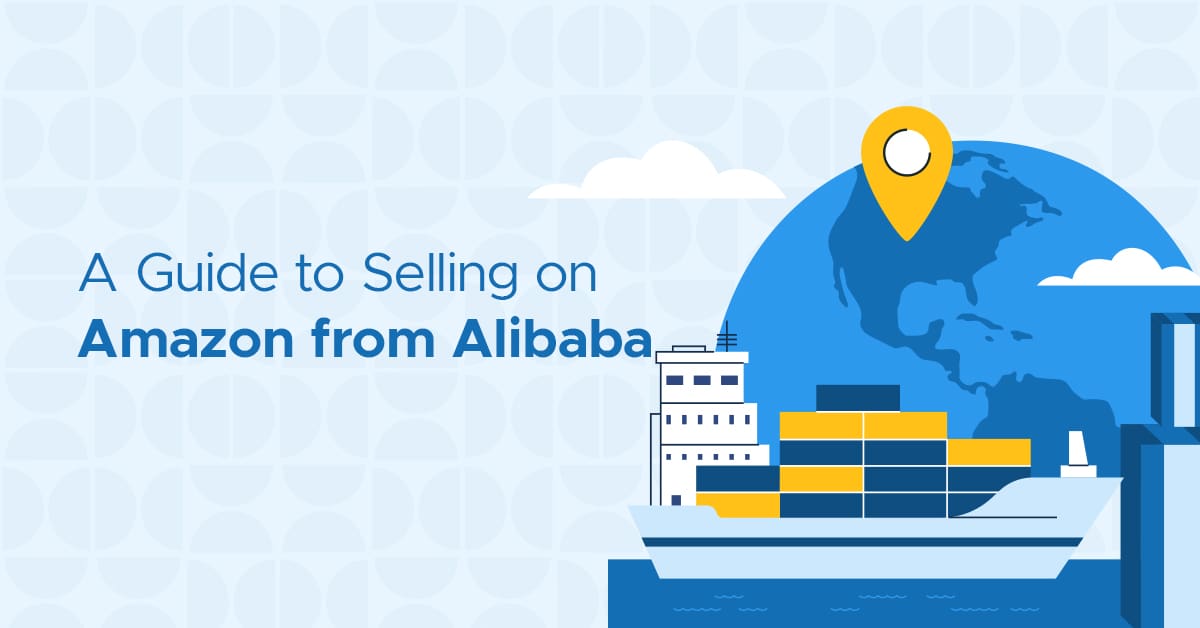
How to Sell on Amazon From Alibaba: A Complete Guide

This is a guest post from Xuan Xie, digital marketing specialist at m19, where she excels at creating strategic content tailored to B2B eCommerce, particularly in the Amazon sector. With a deep-seated passion for eCommerce and expertise in PPC advertising, Xuan is dedicated to driving business growth through a wide repertoire of digital marketing solutions.
Alibaba, the leading Chinese eCommerce platform, offers an extensive array of manufacturers and suppliers. It’s become an attractive platform for global sellers (especially those on Amazon) to source products and earn money with their private labels. Although it’s not a straightforward process, many Amazon brands enjoy healthy profit margins buying from Alibaba and then selling through the FBA program. However, it’s important to find a reliable supplier, ask for samples, negotiate prices, and utilize Amazon PPC to boost your sales.
For those curious about how to sell on Amazon from Alibaba effectively, this article is designed to address your questions and concerns. Read on to learn about the Alibaba platform, including its benefits and risks, how to purchase and market Alibaba products on Amazon, and tips for fulfillment.
What is Alibaba?
Alibaba is a major eCommerce platform based in China that connects buyers and sellers worldwide. It offers a wide range of products, from electronics to clothing, and allows sellers to source goods at competitive prices. Whether you’re a small business owner looking to expand your product line or seeking cost-effective suppliers, Alibaba has something to offer for everyone.
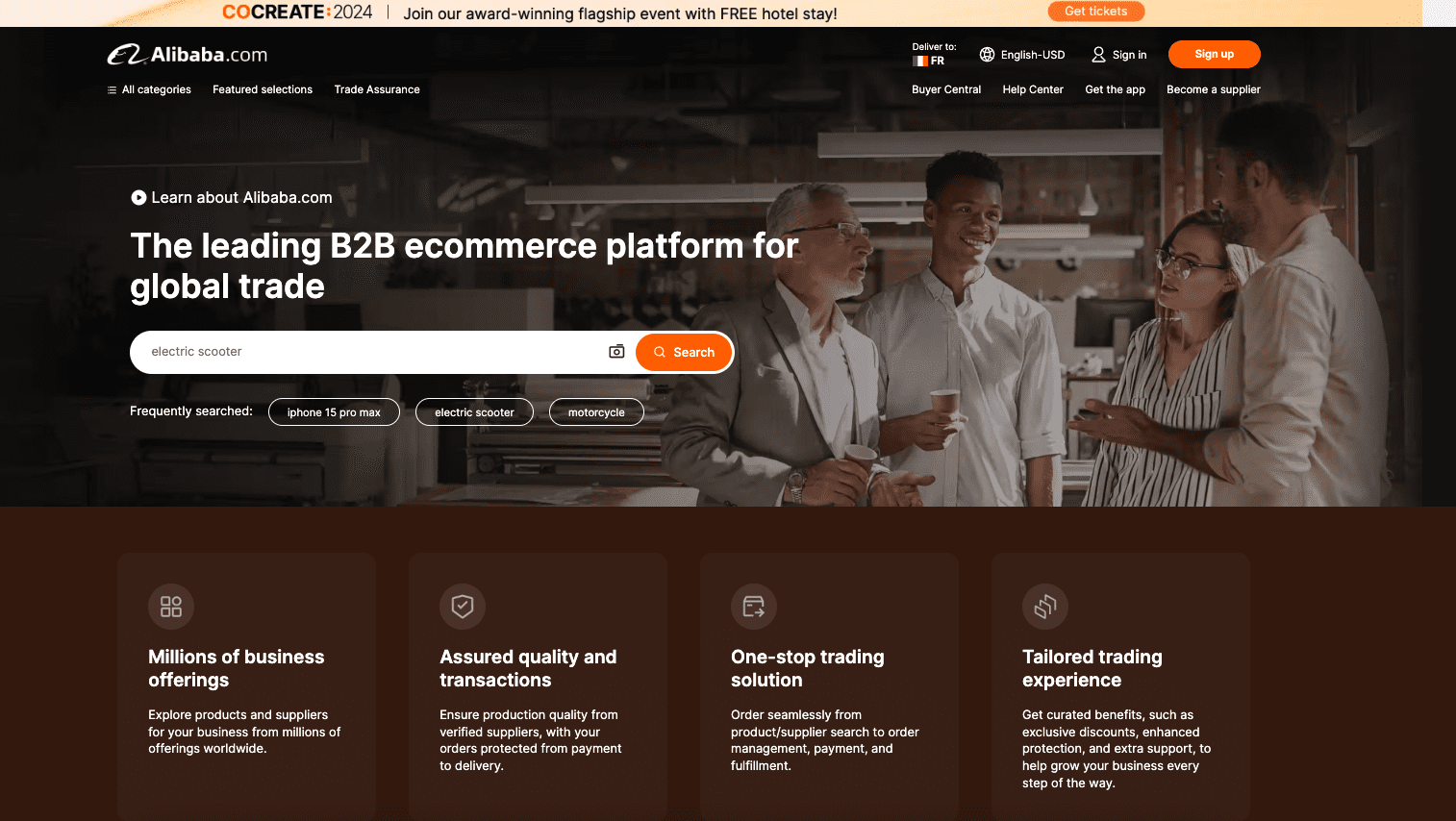
Source: Alibaba.com
Selling products sourced from Alibaba on Amazon is allowed. In fact, many brands purchase items in bulk from Alibaba at lower costs, then sell them on the marketplace. This is known as retail arbitrage or private labeling and is popular among online sellers.
How to Sell on Amazon From Alibaba? The Pros and cons
Buying from Alibaba brings several enticing advantages like:
- Low cost: Alibaba offers products at wholesale prices, which allows you to buy those products at a potentially lower cost.
- Reach manufacturers directly: Many suppliers on Alibaba are manufacturers themselves, so you may be able to cut out middlemen and the associated expenses.
- Customization: Sellers can often request customizations or private labeling on products purchased from Alibaba.
- High margins: With lower sourcing costs, sellers have the potential to achieve higher profit margins.
That being said, this method of procurement also has its drawbacks:
- Quality control issues: Quality control can be a significant issue when sourcing from Alibaba, as products may not always meet the expected standards.
- Communication barriers: Language barriers and time zone differences can cause miscommunication with suppliers.
- Shipping times: Products sourced from Alibaba may have longer shipping times compared to local suppliers.
- Minimum order quantities: Some suppliers on Alibaba have minimum order quantity requirements, which can be an obstacle for small sellers.
- Payment security: You could experience fraudulent transactions or delivery failure.
- Intellectual property infringement: Suppliers may sell counterfeit products.
From Alibaba to Amazon FBA: Who benefits from it?
Many types of businesses can enjoy success by sourcing products from Alibaba. However, two categories of sellers in particular stand to see the greatest gain: dropshippers and private label sellers.
Dropshipping sellers
Sometimes a seller doesn’t want to keep items in stock; instead, they transfer customer orders to a wholesaler, who then ships the goods directly to the buyer. This method, called dropshipping, is beneficial for sellers who want to start a small eCommerce business but don’t want to deal with inventory management. Alibaba provides a vast selection of products that can be dropshipped to customers, opening opportunities for those looking to enter the eCommerce market. This is one way how to sell on Amazon from Alibaba.
Private label sellers
Private label sellers have the advantage of creating their brand and selling unique products without the need to manufacture them on their own when selling on Amazon. If you’re a private label seller, you can contact your Alibaba suppliers about OEM (original equipment manufacturer) or ODM (original design manufacturer) services. If they provide these, you can send them your brand logo, packaging design, and label information, and they’ll produce and package items according to your requirements. When a customer places an order, you simply ask suppliers to ship the products via Amazon FBA, and then the product will be shipped from the FBA center.
How to Sell on Amazon From Alibaba – Buying from Alibaba
To help you begin your Alibaba journey, we’ve broken down the steps to procure items from the platform and then turn them around on Amazon.
Step 1: Find a reliable supplier on Alibaba
When sourcing products from Alibaba to sell on Amazon, securing a credible supplier is crucial. Look for ones with a good track record and positive reviews. Also, make sure to verify supplier credentials and product quality before selling on Amazon.
To carry out this step, go to the Alibaba website and search for the product you want to sell on Amazon. Here, we use “phone case” as an example.
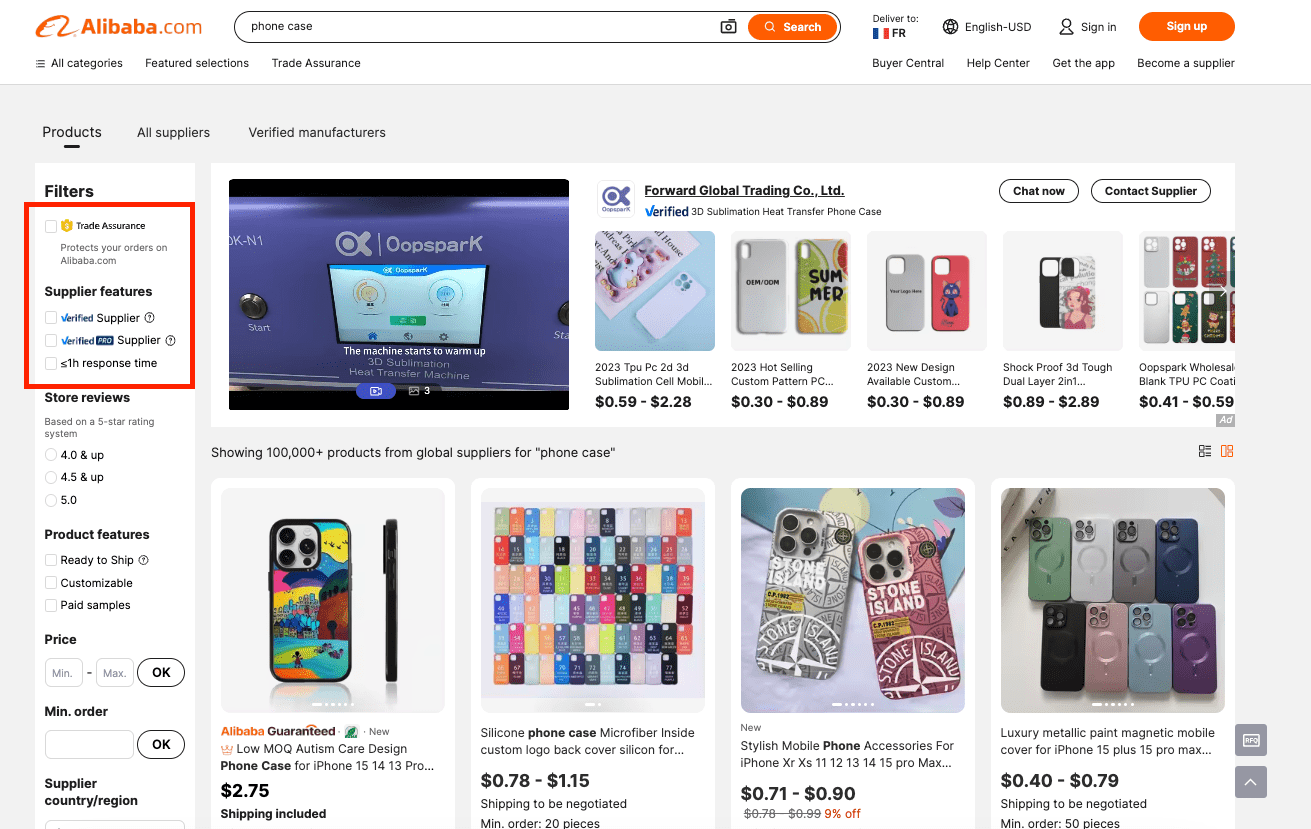
Source: Alibaba.com
On the left side of the page, you’ll see some filters. Select “trade assurance” and “verified supplier” to find the most trustworthy and reliable suppliers. You can also use other filters such as “Min. order” or “Price” to further narrow your candidate pool.

Source: Alibaba.com
Once you run your search, click a product to view its product page and determine if you’ve found a suitable supplier.
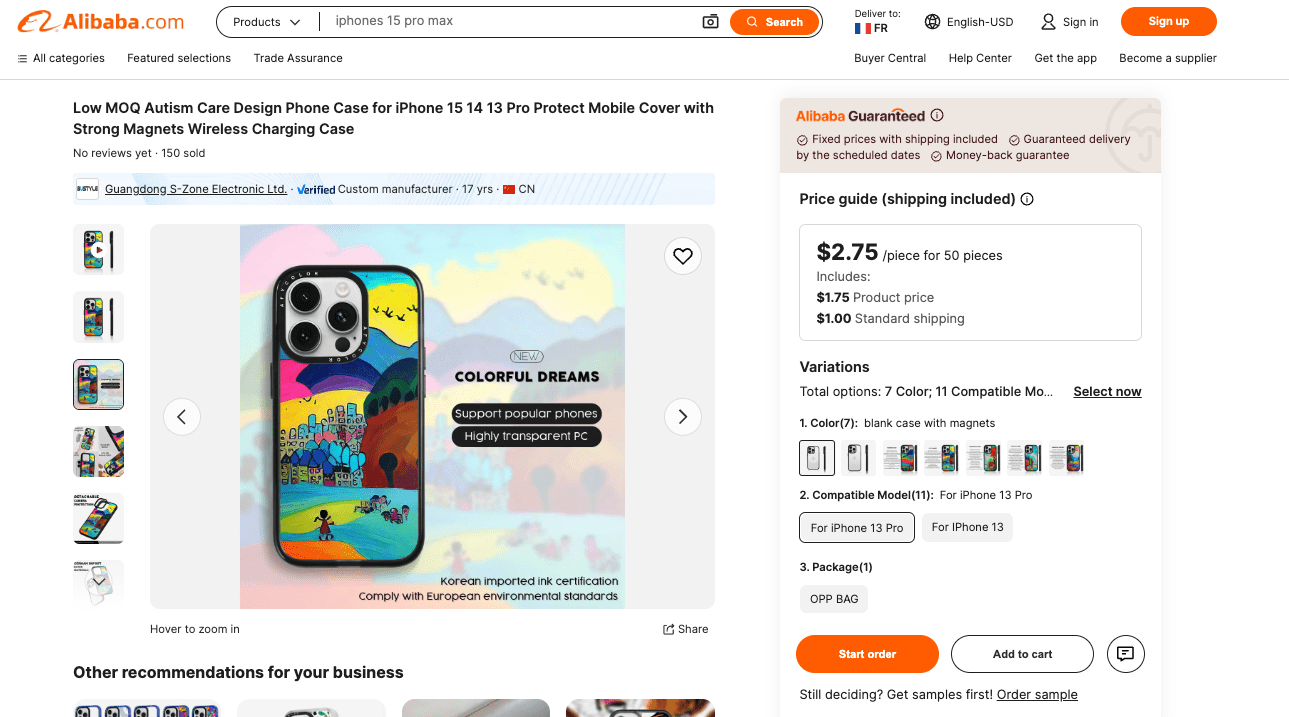
Source: Alibaba.com
Here, you can find all the information about the supplier, such as if they’re Alibaba guaranteed, their store rating, on-time delivery rate, and more.
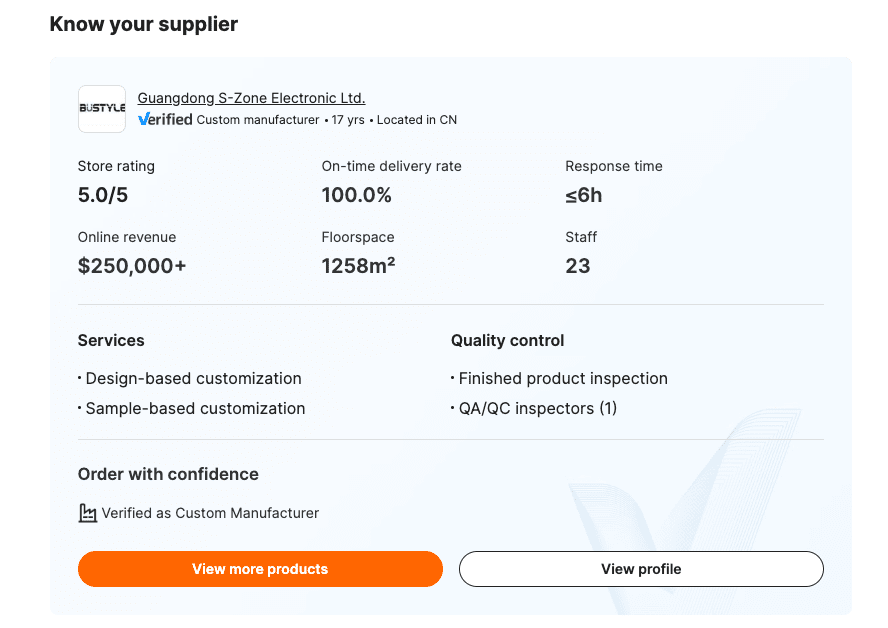
Source: Alibaba.com
To learn more about their information, you can go to the supplier page and chat with them directly. Usually, you can explain that you want to buy from them and sell on Amazon and ask if they’d like to participate.
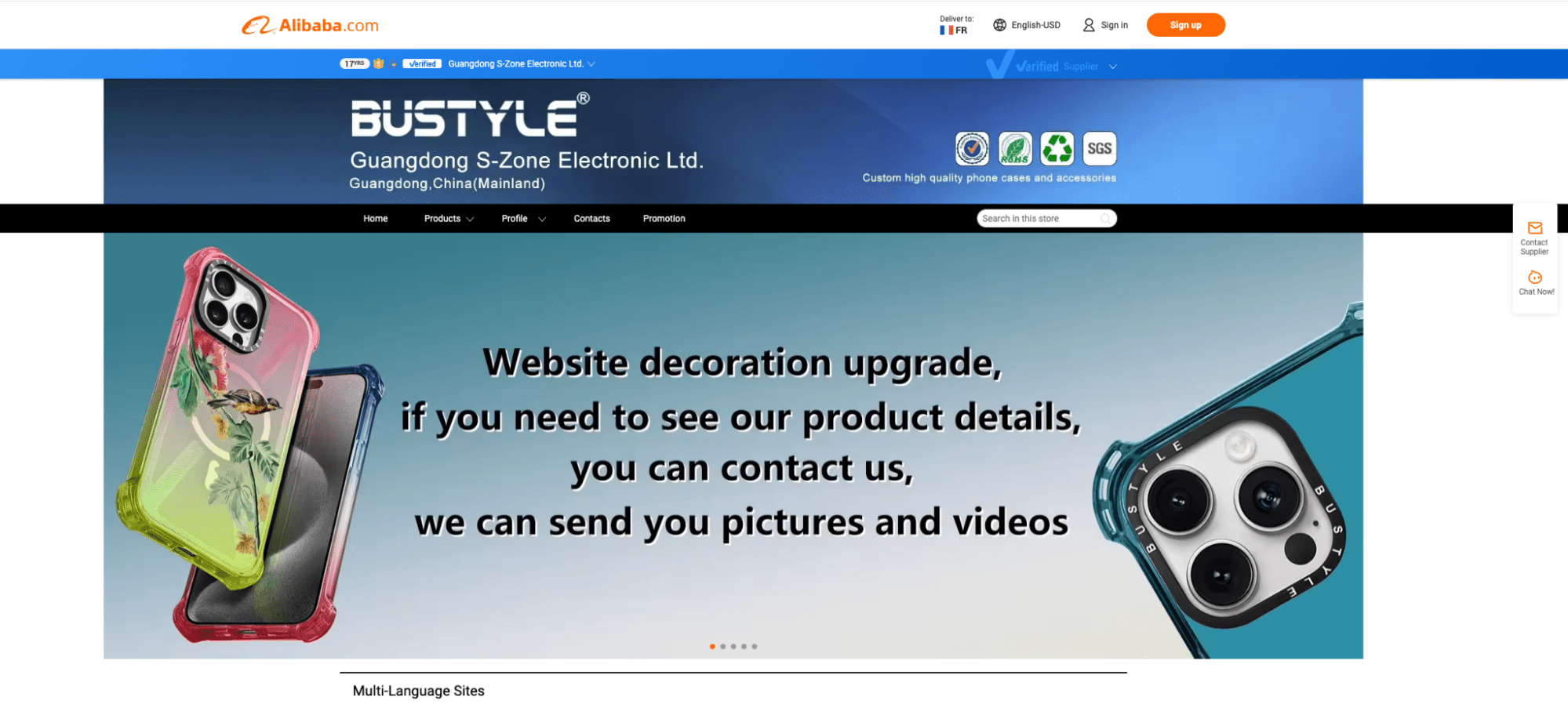
Source: Alibaba.com
Step 2: Ask for sample
Before making a bulk order, always request a sample from your chosen supplier to check the quality of the product. Some like to offer this for free, while for others, you may need to pay them. Also, be aware that it normally takes a few weeks to receive samples.
Step 3: Choose the right shipping method
Decide on the shipping method that works best for you. Factor in shipment costs and delivery times before making a decision. Whether it’s air freight, sea freight, or express shipping, select a reliable and cost-effective option that suits your business needs without eating into profits.
Step 4: Negotiate with suppliers
Negotiation is critical when dealing with suppliers on Alibaba. Don’t hesitate to haggle on prices, MOQ (minimum order quantity), or shipping terms. Push for a fair deal that benefits both parties to encourage long-term collaboration.
Step 5: Start to sell and use Amazon PPC to boost sales
Once you’ve received your products from Alibaba, it’s time to list them on Amazon. Craft strong product listings, improve your SEO, and consider using an Amazon PPC advertising tool such as m19 to drive traffic. After launching, be sure to monitor your sales performance.
How to pay Alibaba suppliers
When learning how to sell on Amazon from Alibaba, it’s crucial to understand that Alibaba provides various payment methods to cater to different needs and preferences. You can choose to pay through credit or debit cards, bank transfers, or use Alibaba’s secure payment gateway, Alipay. Additionally, the platform offers trade assurance to protect buyers’ payments until they confirm receipt of the goods.
- Alibaba Trade Assurance: Alibaba’s Trade Assurance service provides payment protection for buyers. It ensures funds are only released to the supplier once the buyer confirms satisfactory delivery of the items ordered. If issues like delays in shipping time or low-quality goods occur, you’ll be compensated.
- Letter of credit: A letter of credit is a financial document that guarantees payment from the buyer to the seller upon completion of the agreed-upon terms.
- Alibaba Secure Payment service: Alibaba’s Secure Payment service holds the buyer’s payment in a secure account until the buyer receives and approves the products ordered. This protects both sides throughout the transaction.
- Escrow services: Escrow is also a low-risk payment method for sellers. It acts as a neutral third party that holds the amount to be paid until the agreed-upon conditions are met.
First, you and the supplier agree on the price, delivery time, and product details. Then, you place the payment into a secure escrow account. The supplier ships the items, which you receive and inspect to ensure they meet the established terms. Once you confirm everything is correct, the escrow service releases the payment to the supplier.
- PayPal: PayPal is a common and convenient option for transactions on Alibaba and Amazon. It offers buyer protection and allows for secure online payments.
- Bank transfer: This is a more direct method of payment. Before opting for a bank transfer though, it’s essential to verify the recipient’s details to prevent fraud.
How to Sell on Amazon from Alibaba – Shipping
Using Amazon FBA
The FBA program is an easy way to start shipping products from Alibaba to Amazon. With it, you can send your products directly to Amazon’s fulfillment centers, and they’ll handle the storage, packaging, and shipping of your items to customers. The benefits of using Amazon FBA include:
- Prime eligibility: When you fulfill orders through FBA, your products become eligible for Amazon Prime. That designation enhances customer trust and may increase sales.
- Outsourced customer service: Amazon handles all customer inquiries, returns, and refunds to reduce your workload.
- Faster shipping: FBA is known for its fast and reliable shipping, which can lead to higher customer satisfaction.
Using a 3PL
Another option for shipping from Alibaba to Amazon is through a 3PL. This type of service can manage your inventory and shipping processes, as well as bring other advantages like:
- Flexibility: 3PLs craft custom solutions tailored to your specific shipping needs.
- Cost-effectiveness: If you have large shipping volumes, a 3PL can sometimes be more cost-effective than FBA.
- Global reach: Some 3PLs have extensive networks so you can reach a broader customer base.
How m19 scales your business as an AI-powered Amazon PPC tool
Once you’re comfortable sourcing from Alibaba, you can begin planning to scale your Amazon business. One important consideration is optimizing for relevant keywords to improve your product’s visibility in Amazon search results. m19 is an advanced AI-powered tool designed to optimize your Amazon PPC campaigns. Its algorithms explore the most profitable keywords and set up optimal bids to maximize ad performance when you buy from Alibaba and sell on Amazon.
The key features that make m19 so effective are its:
- Amazon PPC automation: Automate bidding so your ads remain competitive in the auction, in turn maximizing your ad visibility and click-through rates.
- Keyword tracking: Monitor and analyze the performance of your bidding keywords to adjust strategies accordingly.
- In-depth reporting: Generate comprehensive reports that provide insights about product groups and ads performance to make informed business decisions.
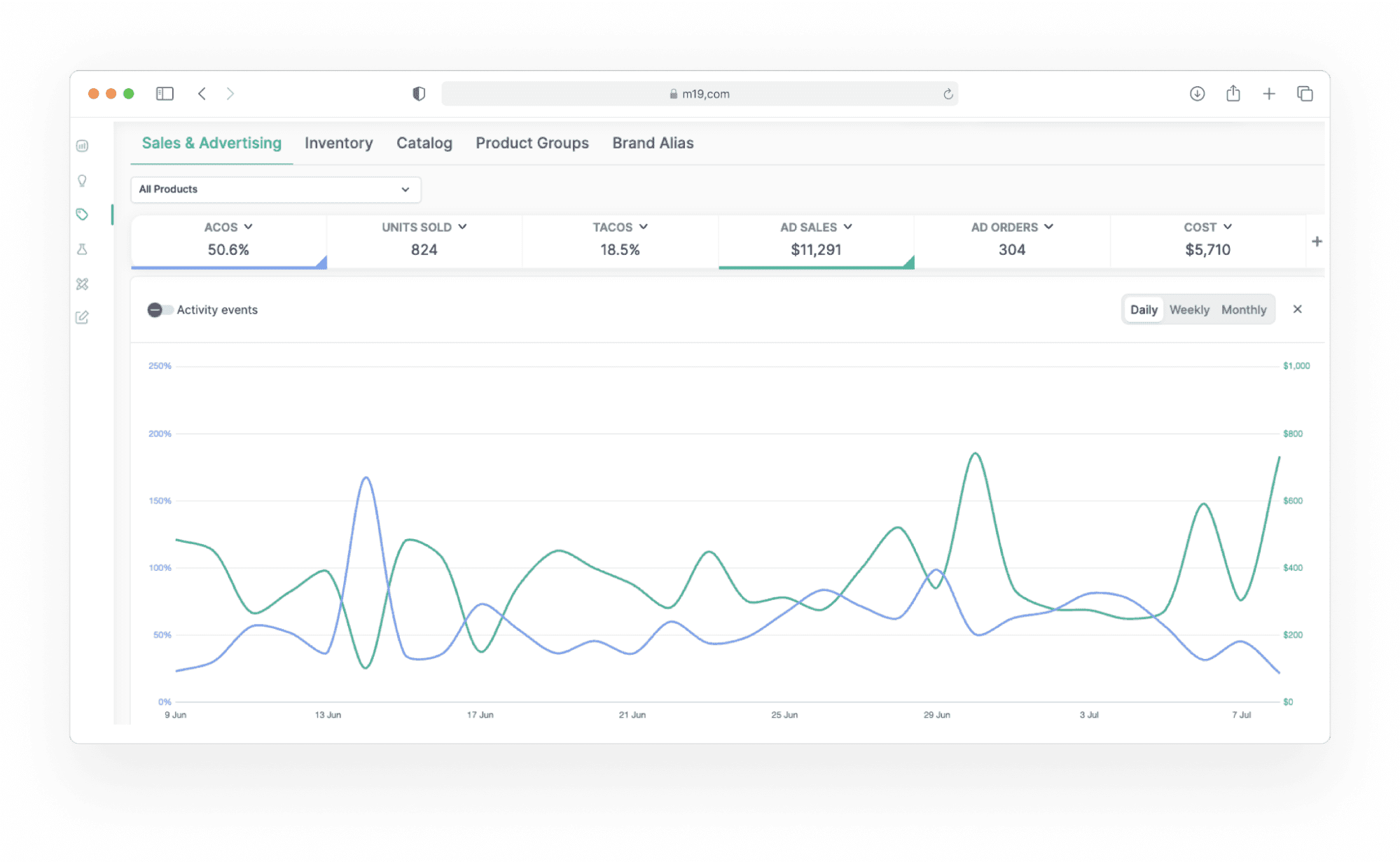
Wrapping up — Give your Amazon business a boost by sourcing from Alibaba
Successfully sourcing products from Alibaba and selling them on Amazon is no simple task. Building an Amazon business takes time, effort, and attention to detail, but with a well-crafted plan and the right suppliers, you can turn your online store into a profitable venture. Remember to conduct thorough market research, establish strong supplier relationships, and provide exceptional customer service to stand out in the competitive marketplace. Learning how to sell on Amazon from Alibaba can be done as long as you know the main items you need to do.

